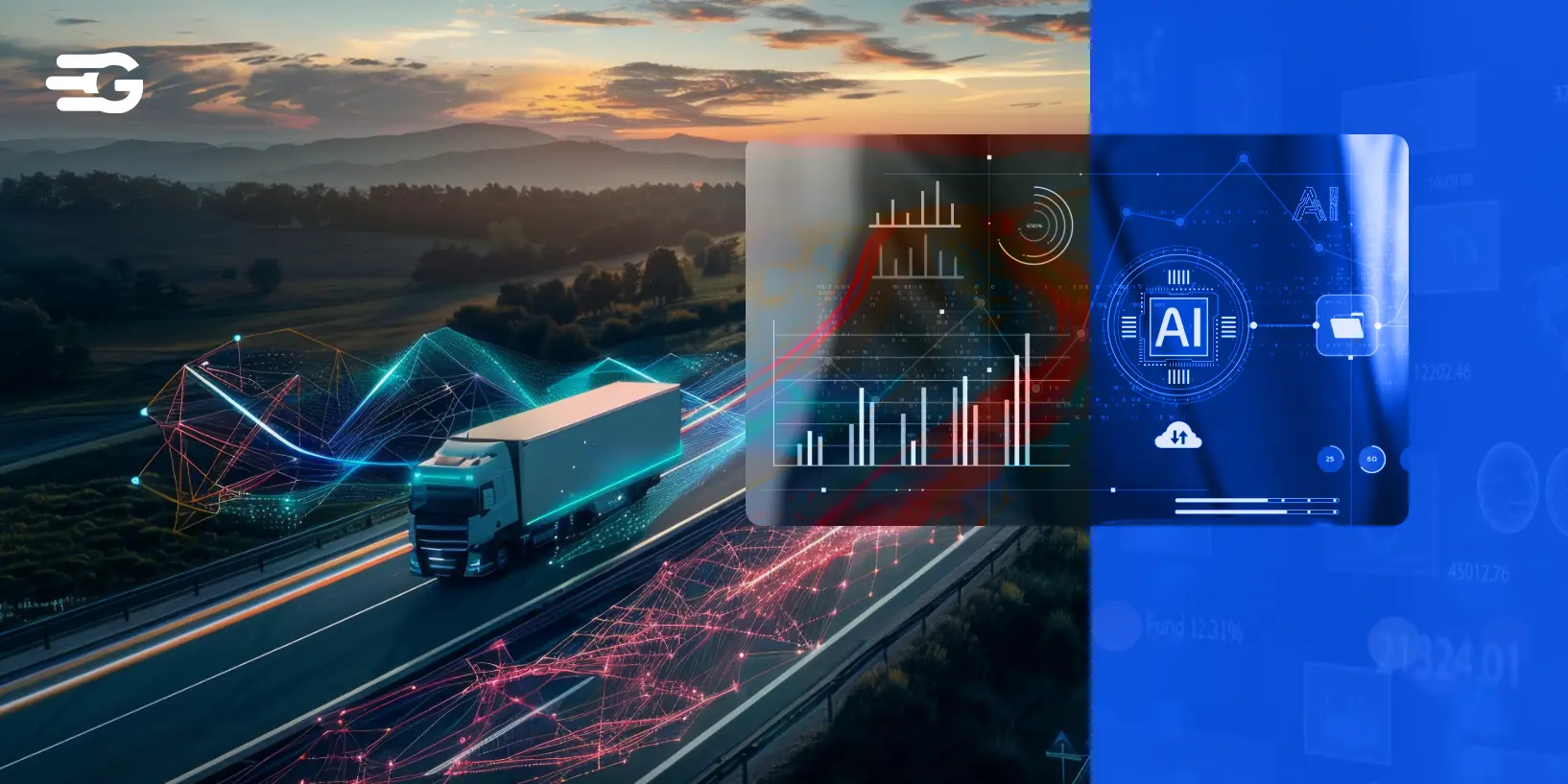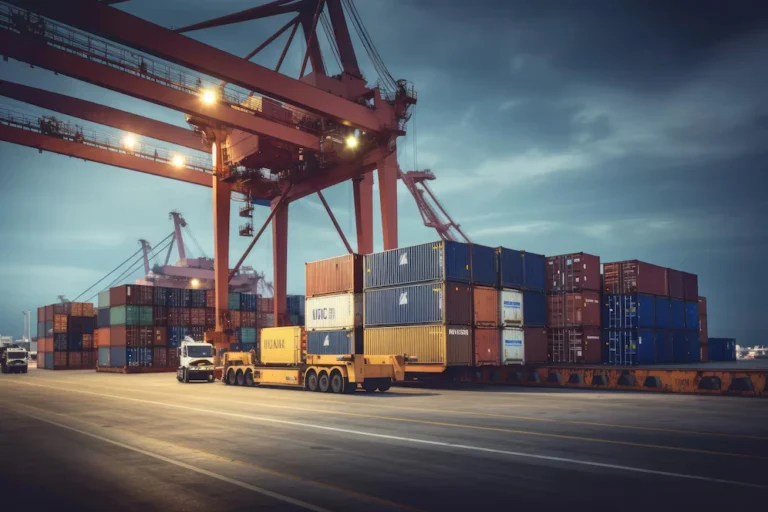AI in Transportation: How Artificial Intelligence is Reshaping Global Logistics
Table of Contents
Supply chains are full of challenges. There are constant delays, high costs, and inefficiencies. AI is changing that.
“The logistics and supply chain industry faces challenges like fragmented visibility, inefficiencies in freight procurement, unpredictable shipping costs, and delays due to manual processes, which GoComet addresses by offering AI-driven tools to streamline operations, provide real-time tracking, and optimize procurement for cost efficiency.” — Chitransh Sahai, Co-Founder of GoComet.
From route optimization to automated freight matching, AI is making logistics smarter, faster, and more cost-effective. Companies that adopt AI gain real-time visibility, lower costs, and better control over shipments. Here’s how AI is transforming global logistics.
The Role of AI in Transportation and Logistics
AI is changing logistics. It is not just about automation. It helps businesses cut delays, reduce costs, and make smarter decisions. AI-powered tools process massive amounts of data in seconds. They optimize routes, predict demand, and improve fleet efficiency. Logistics teams no longer rely on guesswork. AI provides real-time tracking, automated scheduling, and instant problem-solving to keep shipments moving.
Why AI Matters in Transportation
Logistics is full of challenges. Demand shifts quickly. Fuel prices rise without warning. Global regulations change constantly. Manual processes cannot keep up. AI fixes that by processing real-time data and making fast, accurate decisions.
- Predictive analytics help businesses forecast demand, manage inventory, and avoid stockouts.
- AI-driven route planning considers traffic, weather, and fuel costs to speed up deliveries.
- Automated fleet management reduces errors, improves maintenance, and prevents breakdowns.
- Smart cargo monitoring detects damage, prevents disputes, and improves quality control.
- AI-enabled customs clearance speeds up paperwork and ensures compliance with regulations.
AI is not just improving logistics. It is making operations faster, smarter, and more profitable. Businesses using AI today will stay ahead of the competition.
AI in Transportation: Key Use Cases
AI is making logistics faster, smarter, and more cost-effective. It cuts delays, reduces errors, and automates time-consuming tasks. Here is how AI is transforming transportation.
Smarter Routes
AI picks the best routes by analyzing traffic, weather, and past shipment data. It helps businesses avoid delays, reduce fuel costs, and speed up deliveries.
Demand Planning
AI predicts demand by studying market trends, seasonal changes, and buying patterns. This helps businesses manage inventory better and avoid stockouts.
Freight Matching
Finding the right carrier takes time. AI automates freight matching by connecting shippers with carriers based on cost, speed, and availability. This reduces manual work and optimizes freight costs.
Cargo Quality Checks
Damaged shipments lead to losses and disputes. AI-powered image recognition spots cargo damage early, ensuring better quality control and fewer claims.
Shipment Visibility
AI-powered tracking gives real-time shipment updates. Logistics teams can spot delays, fix issues instantly, and keep customers informed.
Fleet Efficiency
AI helps manage self-driving trucks and automated fleets. It improves fuel efficiency, prevents breakdowns, and reduces human errors.
AI for Traffic and Port Flow
Ports and city roads get congested fast. AI predicts and manages traffic flow, keeping shipments on schedule and avoiding bottlenecks.
Customs Clearance
AI automates customs paperwork and compliance checks. This speeds up clearance, prevents errors, and reduces unnecessary delays at borders.
When geopolitical tensions in the Red Sea caused vessels to be rerouted, companies faced higher freight costs and shipment delays. With our real-time tracking and ETA forecasts, businesses could adjust schedules proactively, minimizing disruptions and ensuring smoother customs clearance. This helped save $2.5 million weekly for clients by avoiding unnecessary delays at ports.
AI is not just improving logistics. It is redefining how transportation works, making global supply chains easier to manage, faster, smoother, and more predictable.
How AI Makes Transportation Better
Technology is changing the game in logistics. It saves money, boosts efficiency, and makes shipping more reliable. Here is how.
Cutting Costs
Automation takes over repetitive tasks like scheduling, invoicing, and tracking inventory. This reduces manual work, lowers errors, and speeds things up. Smarter route planning and predictive maintenance also help cut fuel costs and prevent breakdowns.
Smarter Decision-Making
Data-driven insights help logistics managers forecast demand, allocate resources, and avoid delays. With real-time analytics, businesses make faster, better decisions, preventing costly mistakes.
Keeping Shipments on Track
Delays are expensive. Predictive technology analyzes weather, traffic, and supplier reliability to spot potential disruptions early. Real-time alerts allow logistics teams to act fast and avoid costly setbacks.
Making Logistics More Sustainable
Smarter route optimization reduces fuel consumption, while automated systems suggest eco-friendly shipping options. Carbon tracking tools help businesses lower emissions and meet sustainability targets.
This is not just another tech upgrade. It is the key to making logistics faster, smarter, and more cost-effective.
Challenges of Using AI in Transportation
AI is transforming logistics, but it is not without challenges. Businesses must tackle high costs, outdated systems, and security risks to make the most of it.
Expensive to Implement
AI requires investment in software, hardware, and skilled employees. The upfront cost is high, and ROI is not always immediate. However, automation and smarter decision-making help cut costs in the long run.
Hard to Integrate with Old Systems
Many logistics companies still rely on outdated software and manual workflows. AI needs real-time data to work effectively, but older systems are often not compatible. Upgrading takes time and money, making adoption a slow process.
Changing Regulations
AI in transportation is evolving faster than laws. Governments are still figuring out rules for automation and data usage. Businesses must stay compliant with industry standards and cybersecurity regulations to avoid legal issues.
Data Security Risks
AI relies on massive amounts of data, making security a major concern. Companies must protect sensitive shipping and customer information from cyber threats. Strong encryption, access controls, and regular audits are essential to keeping operations safe.
AI is a powerful tool, but businesses need a solid plan to handle these challenges and make the most of it.
The Future of AI in Transportation
AI is set to change the way goods move. From self-driving trucks to ultra-fast shipping, technology will make logistics faster, safer, and more efficient.
Self-Driving Trucks
Autonomous freight transport will cut costs and reduce delays. AI-powered trucks will optimize fuel use, predict maintenance needs, and handle navigation. Companies investing in these fleets will stay ahead of the competition.
More Secure Trade with AI and Blockchain
AI will detect fraud and track shipments in real-time, while blockchain will create tamper-proof transaction records. This means fewer delays, reduced paperwork, and faster customs clearance.
AI-Powered Digital Twins
Businesses will use AI to create virtual models of their supply chains. These digital twins will help predict bottlenecks, test different scenarios, and fine-tune logistics before making real-world changes.
High-Speed Freight Movement
AI will play a key role in next-gen transport like the Hyperloop. It will manage cargo loads, control speeds, and ensure safety, making ultra-fast freight delivery possible.
AI will continue to push logistics forward, helping businesses move goods smarter, faster, and with greater accuracy.
Final Words
AI is not just changing transportation. It is redefining how global logistics work. From predicting demand to automating freight matching and powering self-driving trucks, technology is making supply chains faster, smarter, and more cost-effective.
However, adopting AI is not always easy. High costs, outdated systems, and evolving regulations can slow things down. Still, businesses that invest in AI today will lead the future of logistics. The choice is simple: adapt or fall behind.





